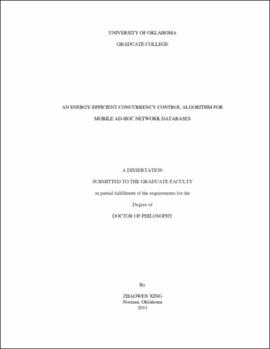| dc.contributor.advisor | Gruenwald, Le | |
| dc.creator | Xing, Zhaowen | |
| dc.date.accessioned | 2019-04-27T21:26:14Z | |
| dc.date.available | 2019-04-27T21:26:14Z | |
| dc.date.issued | 2011 | |
| dc.identifier | 99193308802042 | |
| dc.identifier.uri | https://hdl.handle.net/11244/318685 | |
| dc.description.abstract | With the rapid growth of the wireless networking technology and mobile computing devices, there is an increasing demand for processing mobile database transactions in mission-critical applications such as disaster rescue and military operations that do not require a fixed infrastructure, so that mobile users can access and manipulate the database anytime and anywhere. A Mobile Ad-hoc Network (MANET) is a collection of mobile, wireless and battery-powered nodes without a fixed infrastructure; therefore it fits well in such applications. However, when a node runs out of energy or has insufficient energy to function, communication may fail, disconnections may happen, execution of transactions may be prolonged, and thus time-critical transactions may be aborted if they missed their deadlines. In order to guarantee timely and correct results for multiple concurrent transactions, energy-efficient database concurrency control (CC) techniques become critical. Due to the characteristics of MANET databases, existing CC algorithms cannot work effectively. | |
| dc.description.abstract | In this dissertation, an energy-efficient CC algorithm, called Sequential Order with Dynamic Adjustment (SODA), is developed for mission-critical MANET databases in a clustered network architecture where nodes are divided into clusters, each of which has a node, called a cluster head, responsible for the processing of all nodes in the cluster. The cluster structure is constructed using a novel weighted clustering algorithm, called MEW (Mobility, Energy, and Workload), that uses node mobility, remaining energy and workload to group nodes into clusters and select cluster heads. In SODA, in order to conserve energy and balance energy consumption among servers so that the lifetime of the network is prolonged, cluster heads are elected to work as coordinating servers. SODA is based on optimistic CC to offer high transaction concurrency and avoid unbounded blocking time. It utilizes the sequential order of committed transactions to simplify the validation process and dynamically adjusts the sequential order of committed transactions to reduce transaction aborts and improve system throughput. | |
| dc.description.abstract | Besides correctness proof and theoretical analysis, comprehensive simulation experiments were conducted to study the performance of MEW and SODA. The simulation results confirm that MEW prolongs the lifetime of MANETs and has a lower cluster head change rate and re-affiliation rate than the existing algorithm MOBIC. The simulation results also show the superiority of SODA over the existing techniques, SESAMO and S2PL, in terms of transaction abort rate, system throughput, total energy consumption by all servers, and degree of balancing energy consumption among servers. | |
| dc.format.extent | 161 pages | |
| dc.format.medium | application.pdf | |
| dc.language | en_US | |
| dc.relation.requires | Adobe Acrobat Reader | |
| dc.subject | Ad hoc networks (Computer networks) | |
| dc.subject | Mobile communication systems | |
| dc.subject | Mobile computing | |
| dc.subject | Wireless communication systems | |
| dc.title | AN ENERGY-EFFICIENT CONCURRENCY CONTROL ALGORITHM FOR MOBILE AD-HOC NETWORK DATABASES | |
| dc.type | text | |
| dc.type | document | |
| dc.thesis.degree | Ph.D. | |
| ou.group | College of Engineering::School of Computer Science | |
